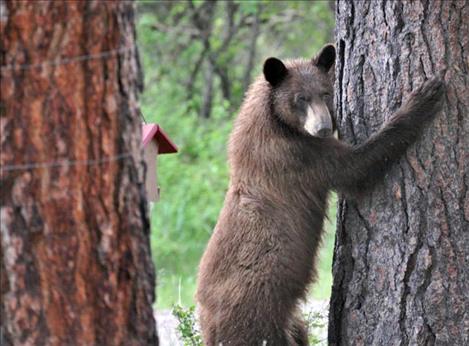Human-bear conflict on the rise, resources available
Hey savvy news reader! Thanks for choosing local.
You are now reading
1 of 3 free articles.
LAKE COUNTY — Summer time means a spike in human-bear conflict, but authorities say there are things people can do to help prevent instances like three in early June where bears had to be euthanized.
According to Polson Police Chief Wade Nash an officer shot and killed a black bear on June 5 on the walking trail behind Super 1 Foods. The bear had been getting in the garbage and caused the closure of Skyline Walking Path a few days earlier, before it began hanging around the Carol Sherick Walking Path. To minimize danger to people, the bear was killed.
“The officer had an opportunity to dispatch the bear in a safe manner and did it,” Nash said.
On June 9 Confederated Salish and Kootenai Tribes wildlife biologists killed two yearling female grizzly bears that were observed multiple times, at all hours of the day, trying to catch cattle. They were suspected of killing calves that were found dead. According to Tribal Information and Education Specialist Germaine White, the whereabouts of the mother bear is unknown. Typically, mother bears stay with yearlings and help care for them.
White said having to kill the bears was particularly unfortunate because both of the bears were females.
“Every future reproductive cycle is lost,” White said.
The grizzly bear is considered a threatened species, because of historically low population numbers in the continental United States. It is protected by federal law.
Because bears often have to be killed after learning how to access human-linked attractants, the Defenders of Wildlife conservation group offers financial assistance to help prevent the bears from becoming habituated to foraging for the attractants in the first place.
The program will pay 50 percent of the cost of installing an electrified wire fence meant to keep bears out, up to $500.
Defenders of Wildlife Rockies and Plains Representative Erin Edge said installing a temporary fence to protect chickens or other small areas of attractants can be as little as $325 before the reimbursement. The reimbursement has also helped mitigate the costs for larger projects that cost thousands of dollars.
Edge said this year has been a busy year for the fencing program, which is available in Beaverhead, Broadwater, Cascade, Carbon, Deer Lodge, Flathead, Gallatin, Glacier, Granite, Jefferson, Lake, Lewis and Clark, Lincoln, Madison, Mineral, Missoula, Park, Pondera, Powell, Ravalli, Sanders, Silver Bow, Stillwater, Sweet Grass, and Teton counties. Fenceable attractants under the program include chicken coops, garbage, beehives, fruit trees, livestock/pet feed, food-waste compost, carcass pits, boneyards, restaurant grease containers, backcountry hunting camps, hanging game, and livestock.
Defenders of Wildlife tries to help people install around 50 fences per year. Due to a huge demand this year early in the season, 65 people have already participated.
Edge said Program Manager Russ Talmo can help people with funding and design ideas for the fences. She recommends that people in city limits check first to see if there are any city ordinances in place regarding electric fences. Talmo can provide on-the-ground assistance, but Edge said most people opt to install the fences themselves.
Edge said many people have begun to realize that bears becoming acclimated to human-related food sources is not a problem that applies only to the impacted landowner.
“Bears are really quick learners. When they figure that out on one property, they will take that to the next property,” Edge said. “It’s not so much a site issue, it’s a community issue.”
The community is invited to see electric fence demonstrations and learn more about bears at the Bear Fair in Condon on June 20. Dr. Chris Servheen, USFWS Grizzly Bear Recovery Coordinator; Tim Manley, a grizzly bear management specialist, and Lori Roberts, a bear research biologist, will discuss the past, present and future status of grizzlies in the Northern Continental Divide Ecosystem, grizzly bear management and conflict resolution, and population monitoring. The event is held from 2-6 p.m. at the MPG Ranch on Rumble Creek Road. Food will be served and people are encouraged to RSVP at 406-754-3137.
People who are experiencing a bear problem on the reservation are asked to call tribal dispatch at 406-675-4700 and tell the dispatcher you have a bear problem.
















